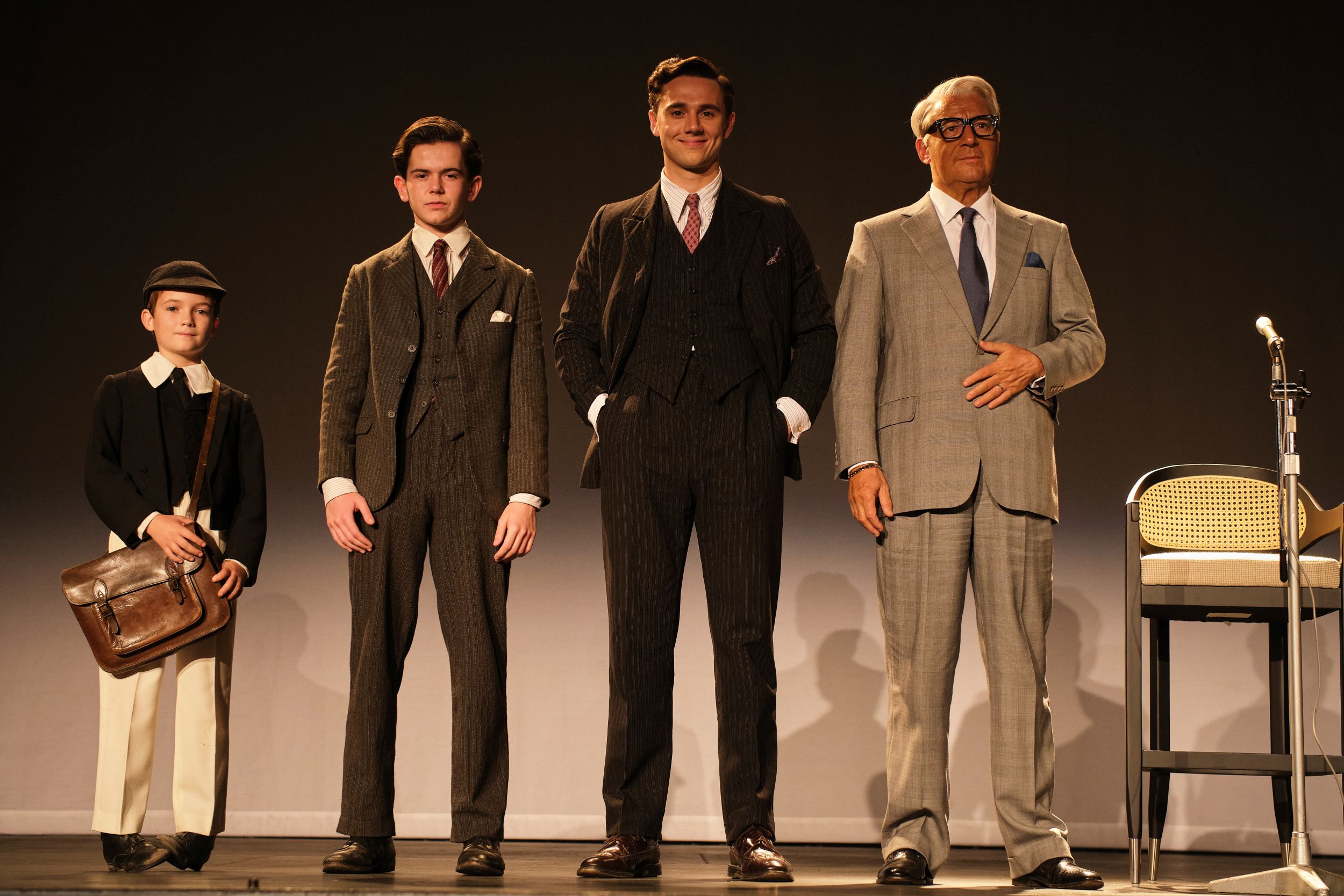BritBox's 'Archie' Tries to Find the Man Behind the Myth of Cary Grant

Jason Isaacs as Cary Grant in 'Archie'
ITVX/BritBox
Most Americans are familiar with actor Cary Grant. Star of such iconic films as North by Northwest, The Philadelphia Story, and An Affair to Remember, Grant is synonymous with the entire concept of Golden Age Hollywood; a wildly popular performer who helped define what we now consider a movie star to be. What many people may not know is that Grant, all-American heartthrob, isn’t American at all. He’s British, hails from Bristol, and his real name is Archibald Leach.
BritBox’s new four-part drama Archie attempts to delve even further into the unknown aspects of the man behind the legendary performer, a notoriously private person who came from poverty, struggled with anxiety, addiction and had a string of disastrous marriages that may or may not have crumpled because of his volatile temper and possessive nature. In doing so, the series heavily leans into the idea that Cary Grant was only ever another role that Archibald Leach was asked to play, both for the public and for himself, for the sake of his career and his own sanity.
“He is a character,” Grant tells a rapt audience during the series’ first episode. “I made him up. I made up the perfect man in order to survive.”
Archie doesn’t always find a way to fully synthesize the public and private aspects of Grant’s persona into a cohesive whole, nor is it always sure of the larger point it’s trying to make. It seems afraid to fully commit to the darker story that lurks underneath its colorful, occasionally cheesy exterior. But the performances at its center make this series better than it has any right to be, and you’ll find yourself wondering exactly where Archie Leach ends and Cary Grant begins. Maybe the fact that we can’t ever know is part of the mystery.
The four-part series follows young Archie from the dark days of his early childhood, through to the massive Hollywood celebrity he achieved, with a quartet of actors playing him throughout his life: Dainton Anderson (Stonehouse) as the youngest Archie, followed by Oaklee Pendergast (Masters of the Air), Calam Lynch (Bridgerton), and finally Jason Isaacs (Mrs. Harris Goes to Paris), who portrays Grant both at the height of his fame and the end of his life, reflecting on the choices he made along the way.
The series resists the idea of telling Archie's story chronologically — likely to allow Isaacs to appear in every episode, an understandable if not particularly well-thought-out urge — though its timey wimey format doesn't do much in the way of drawing parallels between the various "eras" of Grant's life.
The initial episodes present a harrowing view of young Archie's brutal home life: an alcoholic father and an emotionally unstable mother forcibly committed after his older brother dies. The loss of his brother and mother (whom Archie's father tells him is dead) becomes a turning point that ultimately sees Archie turn to the stage as a path to escape. There are charming moments in these coming-of-age segments: teenage Archie learning to walk on stilts, defiant in the face of his father's ire when it's ultimately discovered he's joined a vaudeville troupe. Archie, as a young man in New York City, determined to erase his Bristol accent and furiously studying the night before an audition that could (and did) change his life. But the show doesn't truly reach its stride until Archie Leach changes his name, and Cary Grant steps onto the scene.
Isaacs is a tremendously capable actor, as evidenced by the fact that he has starred properties ranging from Harry Potter to Star Trek. He's relatively tremendous here, uncannily capturing Grant's highly manufactured mid-Atlantic accent and walking a tightrope that honors some of Grant's most famous cinematic moments without ever dipping into what could be called mimicry or caricature. His Grant feels like a man under a constant spotlight, perennially performing the role he believes the world around him wishes to see, existing as more of an idea of a person than an actual man.
In a surprising move, Archie whizzes past the peak of Grant's career; a time-skipping montage breezes past movie posters of classics like His Girl Friday and Bringing Up Baby, picking up with the star in his early 60s. At this point, he's a megastar and miserable, three marriages down and alone, chasing starlets and running from the trauma he carries. But when he sees a young Dyan Cannon (Laura Aikman) on television, he's instantly smitten, going out of his way to track her down and woo her. It is in their doomed relationship that the series finds its strongest focus.
Aikman's Dyan is a delight from the first, grounding her character in an effervescent charm and self-aware intelligence. Thirty-three years his junior, she's smart enough to know a romance with Grant is sure to be a mistake; she nevertheless finds herself drawn in by the relentless charm, self-deprecating humor, and good looks that made him a star in the first place. She's wary when he insists he doesn't want a family, even ends things with him at one point, but ends up marrying him, ignoring all the red flags of his controlling nature. The collapse of their brief union, though vaguely framed around Grant's discovery his mother Elsie (played by a prickly Harriet Walter) is still alive, is really about Cannon's ultimate decision to save herself and the daughter they share from a relationship that's crushing her spirit.
Archie is willing to look at the dark underbelly of the man Grant was without flinching, though it doesn't go as far as it could. We see him constantly belittling and badgering Dyan, correcting her grammar, shoving coasters under her glasses, commenting on her clothes, attempting to control her career choices, and telling her what kind of mother to be. (He even gives her dog away while she's giving birth to their daughter!) Yet the show is reluctant to do more than hint at the alleged physical violence (though it does even less in slyly winking at rumors Grant was bisexual).
There's a sense the show wants it both ways: to honor the legacy of Grant while questioning whether there's a bit of tarnish on it. There's a long tradition of biopics that do little more than sanitize their famous subject matter, making their memories palatable for the people who love their work. Archie doesn't do that, and that's no small thing. That it decides Grant was a man haunted by his past, forged by an era that denied him the emotional space to deal with his (many) traumas, is as fair an assessment as any.
The show's weakest element is its framing device of Grant during his late-in-life one-man tour, Conversations with Cary Grant. Visibly softer and less ornery, these scenes are shot through with an implication he's found a measure of peace in the fatherhood he never wanted via his relationship with his daughter Jennifer. The scenes don't fully undercut Grant's darker tendencies, but the "ends justify the means" message feels uncomfortable. See, he turned out okay, eventually; surely the rest of it can't be but so bad. That is what keeps Archie from being truly great television. Try as it might — and Isaacs and Aikman try their darnedest — it can't find a way to hold the competing halves of Grant into a cohesive hole.
All episodes of Archie are streaming on BritBox.






